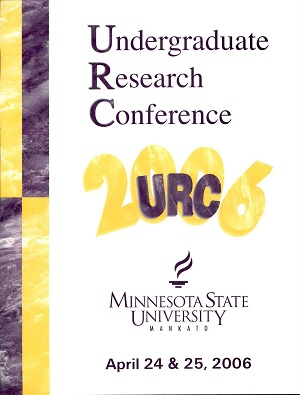Investigation of the Magnetic Properties of Strongly Correlated and Hybridized Electron Systems
Location
CSU 201
Start Date
25-4-2006 10:30 AM
End Date
25-4-2006 12:00 PM
Student's Major
Physics and Astronomy
Student's College
Science, Engineering and Technology
Mentor's Name
Igor Kogoutiouk
Mentor's Department
Physics and Astronomy
Mentor's College
Science, Engineering and Technology
Description
The magnetic and thermodynamic properties of strongly correlated and hybridized electron systems were investigated within the framework of the periodic Anderson model. A series of approximations were applied within the Green function method to obtain a system of self-consistent equations for chemical potential, orbital occupancies, and magnetic order parameters. The solution, found in the mean-field approach, showed that the energy spectrum of the model consists of two hybridized subbands, while application of the Hubbard 1 type decoupling led to the appearance of four energy subbands. It was also shown that in the half-filled symmetrical model the magnetization occurs above some critical value of the magnetic field reflecting the appearance of field-driven insulator-metal transition. In the non-half-filled systems the spontaneous ferromagnetic ordering exists in some temperature range, determined by the electronic concentration,/-level position and mixing parameters values. The present theoretical research could be applied for the explanation of existing experimental data of the magnetic behavior of the intermetallic compounds containing cerium, ytterbium, and uranium elements.
Investigation of the Magnetic Properties of Strongly Correlated and Hybridized Electron Systems
CSU 201
The magnetic and thermodynamic properties of strongly correlated and hybridized electron systems were investigated within the framework of the periodic Anderson model. A series of approximations were applied within the Green function method to obtain a system of self-consistent equations for chemical potential, orbital occupancies, and magnetic order parameters. The solution, found in the mean-field approach, showed that the energy spectrum of the model consists of two hybridized subbands, while application of the Hubbard 1 type decoupling led to the appearance of four energy subbands. It was also shown that in the half-filled symmetrical model the magnetization occurs above some critical value of the magnetic field reflecting the appearance of field-driven insulator-metal transition. In the non-half-filled systems the spontaneous ferromagnetic ordering exists in some temperature range, determined by the electronic concentration,/-level position and mixing parameters values. The present theoretical research could be applied for the explanation of existing experimental data of the magnetic behavior of the intermetallic compounds containing cerium, ytterbium, and uranium elements.
Recommended Citation
Raymer, Eric. "Investigation of the Magnetic Properties of Strongly Correlated and Hybridized Electron Systems." Undergraduate Research Symposium, Mankato, MN, April 25, 2006.
https://cornerstone.lib.mnsu.edu/urs/2006/oral-session-M/3




